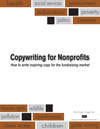Write short sentences. Use few adjectives. Keep it simple. Get higher response.

Power to the copy!
That opening paragraph is known as writing in the imperative voice or mood. It gets attention because it sounds like a command. It has power.
The key is short sentences. Also start with a verb when possible.
Of course the entire email or letter can’t be in the imperative voice. But it works great for the lead, closing, P.S., or anywhere else for emphasis and clarity. Try it.
Fundraising copy thrives on simplicity
Simplicity includes short paragraphs and sentences.
It also includes simple words (mostly one and two syllables with a handful of three syllable words thrown in).
A recent post on Neuromarketing touted the power of simple copy, “The Dark Side of Adjectives.”
Their point was that for stories and posts to get shared in social media, the simpler the writing style…the more likely it was to be passed on. This held true for news outlets, blogs, etc.
It was based on research for a book by Dan Zarrella titled, Zarrella’s Hierarchy of Contagiousness. Zarrella discovered that “… the least shared content had the highest use of adverbs and adjectives.”
The fact that it gets shared is a response. People took an action. Therefore his research also demonstrates that simple copy gets higher response.
As I showed with the imperative voice in the first paragraph of this post, nouns and verbs move the reader forward. Modifiers slow the reader down.
And your goal is to keep the reader moving forward to your call-to-action.
Nothing new just more proof that simple copy is the most powerful. And it doesn’t matter whether you’re writing to engineers, scientists, medical professionals, or any other well-educated audience. Simple copy gets higher response. And it gets shared more often.
Keep it simple. Raise more money. Acquire more donors and members.
Related posts:
2 Fundamentals of a Strong Fundraising Appeal

{ 1 trackback }
{ 0 comments… add one now }